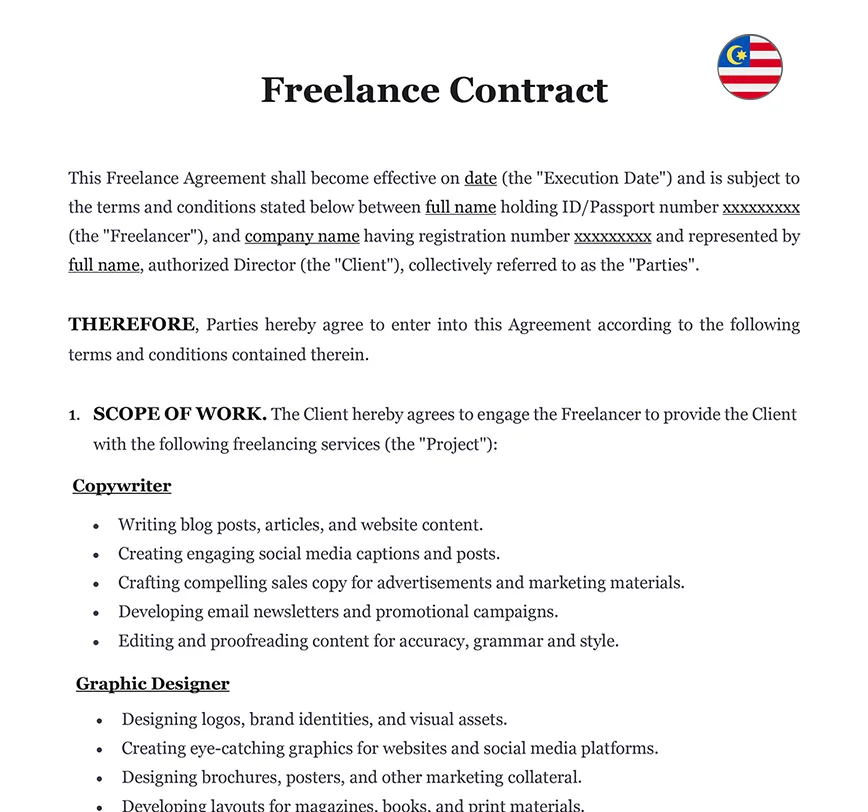Ready to use legal template
Drafted by experienced lawyers
Compliant with Malaysian law
Ready to use legal template
Drafted by lawyers
Compliant with Malaysian law
Home › Business contracts › Freelance Contract
Learn more about Freelance Contract in Malaysia
A freelance contract in Malaysia is a legally binding agreement between a freelancer, who provides services on a project basis, and a client, who hires the freelancer for a specific task or project. This contract outlines the terms and conditions of the engagement, including the scope of work, deliverables, payment structure, intellectual property rights, confidentiality, revisions, termination, dispute resolution, and any additional clauses specific to the working relationship. It serves as a crucial document to establish clear expectations, protect the rights of both parties, and ensure a successful and mutually beneficial working arrangement. Themis Partner offers you an easy to edit Freelance Contract drafted by lawyers to comply with the law in Malaysia.
Table of contents
What is a Freelance Contract?
A freelance contract, also referred to as an independent contractor agreement or service agreement, is a legally binding agreement between a freelancer (or independent contractor) and a client. The freelance contract, or consulting agreement, serves as a crucial document that formalises the consulting relationship between the freelancer and the client, protecting the rights and interests of both parties. It ensures clarity and establishes mutual expectations, allowing for a smooth and productive collaboration while mitigating potential disputes or misunderstandings.
Why use a Freelance Contract?
Using a freelance contract in Malaysia is essential for several reasons:
| ➤ Firstly, it provides a clear and legally binding agreement that outlines the terms and conditions of the freelance engagement, protecting the rights and interests of both the freelancer and the client. This helps establish a professional working relationship based on mutual understanding and expectations. |
| ➤ Additionally, a freelance contract ensures clarity regarding the scope of work, deliverables, timelines, and payment terms, minimising potential disputes or misunderstandings. |
| ➤ It also addresses crucial aspects such as intellectual property rights, confidentiality, revisions, termination, and dispute resolution mechanisms. |
| ➤ Ultimately, using a freelance contract in Malaysia provides a solid framework for successful collaborations, promoting trust, accountability, and fair treatment for all parties involved. |
ℹ️ By having a well-defined freelance contract in place, both parties can navigate the engagement smoothly and with confidence, while adhering to Malaysian legal requirements and business practices.
What should a Freelance Contract include?
A freelance contract consists of several important clauses that help define the rights, responsibilities, and obligations of both the freelancer and the client. One crucial clause is the scope of work, which outlines the specific tasks and deliverables expected from the freelancer. The payment clause specifies the agreed-upon compensation structure and schedule. Intellectual Property clauses address ownership and usage rights of the work produced during the engagement. A confidentiality or Non-Disclosure Agreement (NDA) clause ensures the protection of sensitive and proprietary information shared during the project. Revisions and edits clauses establish the process for making changes or modifications to the deliverables. Termination clauses outline the conditions under which either party can end the contract. Additionally, dispute resolution clauses provide mechanisms for resolving conflicts, and non-compete clauses may restrict the freelancer from competing with the client during and after the engagement.
These clauses, along with others tailored to the specific needs of the project, collectively create a comprehensive freelance contract that safeguards the interests of both parties involved.
What are the rights of a freelancer in Malaysia?
Freelancers in Malaysia have certain rights that protect their interests and ensure fair treatment in their working relationships.
| ➤ Firstly, freelancers have the right to enter into written contracts that clearly outline the terms and conditions of their engagements, including scope of work, payment terms, and project timelines. |
| ➤ They also have the right to be compensated fairly and in a timely manner for their services. |
| ➤ Freelancers have the right to maintain ownership of their intellectual property, unless otherwise agreed upon in the contract. |
| ➤ Additionally, freelancers have the right to privacy and confidentiality, where their personal and sensitive information should be handled with care and not disclosed without their consent. |
| ➤ They also have the right to a safe working environment and protection against discrimination or harassment. |
ℹ️ It is important for freelancers to be aware of their rights and to ensure that their contracts and working arrangements align with these rights to foster a professional and mutually beneficial working relationship.
How to pay and send a freelance invoice?
Paying and sending a freelance invoice can be done through a straightforward process to ensure efficient and timely payment. Firstly, it is essential to create a professional and detailed invoice that includes the freelancer’s contact information, the client’s details, invoice number, date, and a clear breakdown of the services provided, including quantity, rate, and any applicable taxes. Once the invoice is prepared, it can be sent to the client via email or a secure online invoicing platform. It is crucial to clearly communicate the payment terms, such as the due date and preferred payment methods, whether it be bank transfer, PayPal, or any other agreed-upon method. Following up on the invoice may be necessary if payment is delayed or outstanding. Maintaining good record-keeping practices by saving copies of sent invoices and tracking payment receipts can assist in organizing financial records.
ℹ️ By ensuring clear communication, professional invoicing, and timely follow-up, freelancers can streamline the payment process and maintain a healthy financial relationship with their clients.
What is the difference between an employee and a freelancer?
There are several key differences between an employee and a freelancer:
1. Employment relationship
An employee works for an employer under an Employment Contract, whereas a freelancer operates as an independent contractor, offering services on a project or assignment basis.
2. Control and independence
Employees typically work under the direction and control of their employer, following set schedules and procedures. Freelancers, on the other hand, have more autonomy and control over their work, deciding when, where, and how to complete their projects.
3. Tax and Benefits
Employees are often subject to income tax withholding and are entitled to various benefits provided by the employer, such as health insurance, paid time off, and retirement plans. Freelancers are responsible for their own tax obligations and generally do not receive employee benefits.
4. Work Arrangement
Employees typically have a long-term, ongoing relationship with their employer, often working full-time or part-time. Freelancers, on the other hand, have more flexible and project-based arrangements, working with multiple clients concurrently.
5. Employer Obligations
Employers are responsible for providing a safe work environment, complying with Labor Laws, and offering certain protections to employees, such as minimum wage and overtime pay. Freelancers are responsible for their own business operations, including ensuring their work meets client requirements and fulfilling contractual obligations.
6. Payment Structure
Employees usually receive a regular salary or wages, while freelancers are typically compensated based on a negotiated project fee or hourly rate.
What if I don’t have a freelancer contract?
If you don’t have a freelancer contract in Malaysia, it can lead to various potential issues and uncertainties. Without a formal agreement in place, both you as a freelancer and your client may face difficulties in clarifying important aspects of the working relationship. A contract serves as a legal document that outlines the scope of work, payment terms, project deadlines, intellectual property rights, confidentiality agreements, and dispute resolution mechanisms. Without these provisions clearly defined, disputes over payment, project expectations, or ownership of work can arise, leading to potential financial losses, strained relationships, and legal complications. Having a freelancer contract is essential for protecting your rights, setting clear expectations, and establishing a professional foundation for your work engagements in Malaysia.
SPECIAL OFFER
Startup
15 Document Package
Essential documents for running your business in Malaysia
Freelance ContractTemplate (.docx)
Save on attorney fees
310 client reviews (4.8/5) ⭐⭐⭐⭐⭐
Share information
Why Themis Partner ?
Make documents forhundreds of purposes
Hundreds of documents
Instant access to our entire library of documents for Malaysia.
24/7 legal support
Free legal advice from our network of qualified lawyers.
Easily customized
Editable Word documents, unlimited revisions and copies.
Legal and Reliable
Documents written by lawyers that you can use with confidence.




